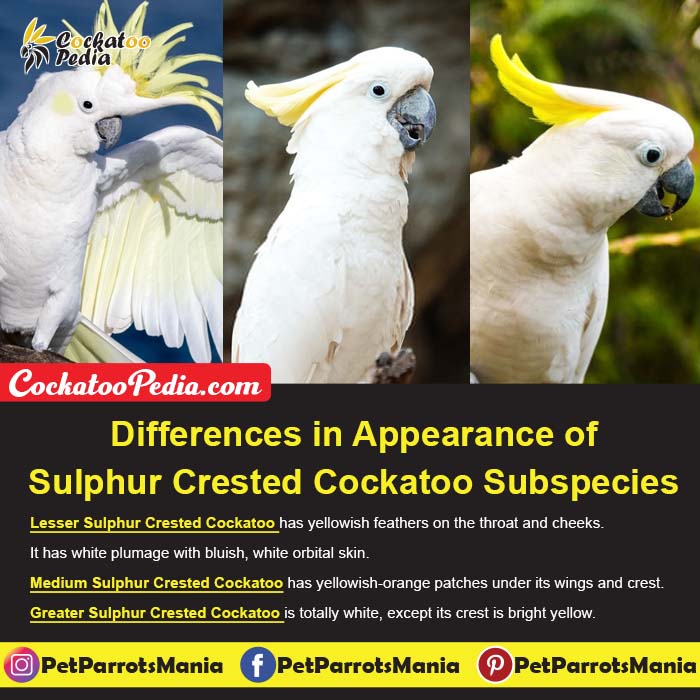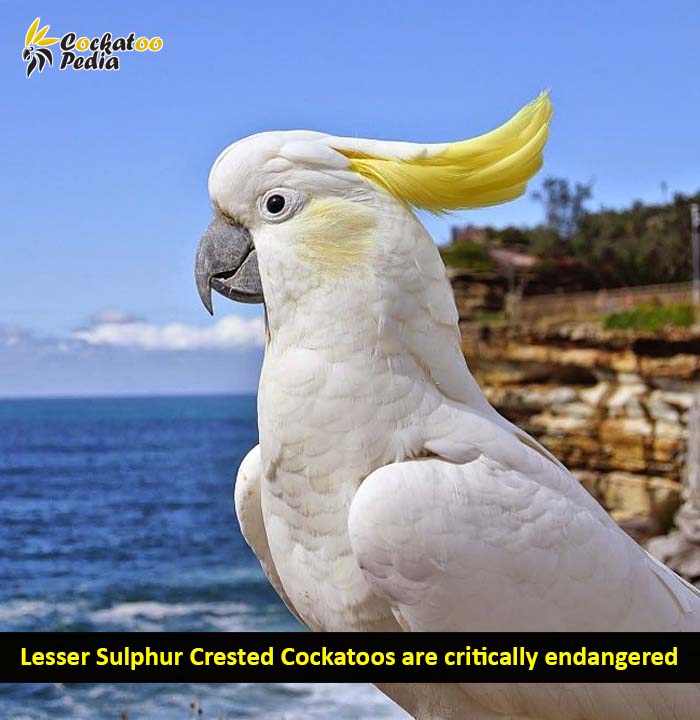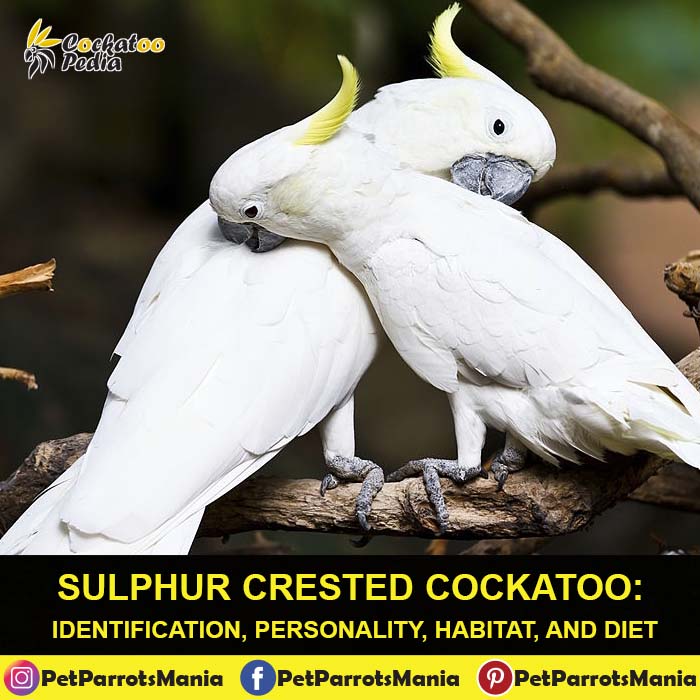Sulphur Crested Cockatoos are affectionate, friendly, and adorable white parrots. Just like all cockatoos species, they have distinct personality traits and features. Let’s talk about how they look and what makes them different.
Sulphur Crested Cockatoos, scientifically known as Cacatua Galerita, is a large species of the cockatoo family. They live in the woodlands of Australia and the Indonesian Islands. Their identification is a white body with yellow-tinged underwings, tails, and crests.
| Scientific Name | Cacatua Galerita |
| Habitat | Woodlands of Eastern Australia |
| Weight | 780 grams |
| Size | 20-21 inches |
| Diet | Fresh fruits, nuts, seeds, meat, and vegetable |
| Lifespan | 60 to 70 years or even more |
| Breeding Season | Southern Australia: Aug-Jan Northern Australia: May-Sep |
| Conservation Status | Least Concern |
| Hybrids | No |
| Adult Price | $2500 |
| Baby Price | $500-1000 |
Now let’s talk about the appearance, diet, behavior, and endangerment status of Sulphur Crested cockatoos.
Appearance
Sulphur Crested cockatoos have beautiful white Plumage and expressive yellowish crests on their heads. They have white-colored eye rings, yellow-tinged underwings, and powerful black bills. They have black legs and dark gray feet.
Difference Between Male and Female Appearance
The male and female Sulphur Crested cockatoos have similar appearances except for the dark eye color of male and brownish tones of female eyes. The extraordinary resemblance makes it difficult to identify a Sulphur Crested cockatoo gender. Usually, they are identified with their pelvic and DNA sexing.
Baby Appearance
Baby Sulphur Crested cockatoos develop the colors of adult cockatoos in the first 60 days. But the color shade is initially bright and it slightly darkens as they age.
Sub-species of Sulphur Crested Cockatoos and Their Differences
They have four sub-species and the differences between all subspecies of Sulphur Crested cockatoos are insignificant.
- Lesser Sulphur Crested cockatoo is the smallest subspecies of Sulphur Crested Cockatoos. It has prominent yellow patches on its cheeks.
- Medium Sulphur Crested cockatoo is bigger than Lesser Sulphur Crested cockatoos and smaller than Greater Sulphur Crested cockatoos. It has slightly orange-yellow shades in the color markings.
- Greater Sulphur Crested cockatoo is the largest species of Sulphur Crested cockatoos.
- Triton Cockatoo has the largest and most prominent crest among all subspecies. It has almost the same size as Medium Sulphur Crested cockatoos.

Weight, Size, and Wing-span
Sulphur Crested cockatoos are larger than Galah cockatoos and smaller than Black Palm cockatoos. Their size is about 20 to 21 inches and they weigh up to 780 grams. Their wingspan is about 40 inches.
Voice
Sulphur Crested cockatoos have super raucous vocals. They are not too noisy, but the pitch of their sound is high. They are among the most talkative cockatoo species as they can learn to mimic 200+ human words.
Habitat
These parrots are native to Eastern Australia, New Guinea, New Zealand, Malaysia, and the Indonesian islands.
Diet
They like to eat fruits, vegetables, seeds, and nuts. In the wild, they also eat insects and rocks. They can also eat meat, chicken, and fish as they are omnivores, but they usually don’t eat them. The best diet for them is a variety of sliced fruits and seeds.
Lifespan
In the wild, they can live for 20 to 40 years. Their lifespan is shorter in the wild because of hunting and habitat loss. They can live up to 70 years in captivity if given proper care.
Nature as Pets
Sulphur Crested Cockatoos are very loving and friendly parrots. They love to be given attention and taught tricks and words. They become excellent companies with their owners, especially children.
| Pros | Cons |
|---|---|
| Loving and affectionate | Loud and noisy |
| Learn to talk and act | Moody about food |
| Playful and inquisitive | Can be destructive when feeling insecure |
| Can be easily tamed | Like to chew everything |
Breeding
Sulphur Crested cockatoos are monogamous, they mate for life with one partner.
Breeding Age
They usually start breeding at the age of 3 years. Some Sulphur Crested cockatoos can take up to 6 years to breed.
Breeding Season
In Southern Australia, their Breeding season is from August to January, and in Northern Australia, their breeding season lasts from May to September. These breeding months can vary according to climate conditions.
Breeding Capacity
They lay eggs twice a year, and their clutch size is about 2 to 4 eggs.
Maximum Breeding Age
Sulphur Crested cockatoos can breed for almost 30 years, and some can breed even more if properly cared for.

Population and Endangerment Status
Sulphur Crested cockatoos are spread over a wide range of regions, and their actual population is not quantified. According to the IUCN report, the overall endangerment status of Sulphur Crested cockatoos is least concerned species. (i) But their subspecies, Lesser Sulphur Crested cockatoos are critically endangered. Work is being done to restore their endangerment status; this subspecies is being introduced on unpopulated islands.
Sulphur Crested Cockatoo Price:
The cost of Sulphur Crested cockatoos is about $1000 to $2000, depending on their age, health, breeding history, and other characteristics.
| Adult | $2000 |
| Tame (Young) | $1500 |
| Baby (Self-feeding-aged) | $500 |
| Baby (Hand-feeding-aged) | $1000 |
Can Sulphur Crested Cockatoo Produce Hybrids
Over the last few years, a hybrid species of Sulphur Crested cockatoo has emerged. It was produced when a Sulphur Crested cockatoo was cross-bred with a Galah cockatoo.
Conclusion
Sulphur Crested cockatoos are one of the most gorgeous and loveliest species of cockatoos. They have vibrant colors and friendly nature. If you are looking to buy a playful pet, Sulphur Crested cockatoos are a good choice.


Hi Bilal,
We have a family of 4 cockatoos (Sulphur crested white) that visit our house daily. The female adult is very friendly, and sits on the chairs or table in our covered outdoor room. The adult male is more aggressive, but is starting to act less aggressive.
There are 2 younger birds, the have slightly greyish white feathers at the moment.
One of the adults has a tag on its leg, what does that mean?
We feed them seed daily is that something we should stop?
Your advice would be appreciated.
David Farrar
Hi David. The tag means someone has marked/claimed the bird. Most probably, the bird has been set free by some cockatoo conservation program, and they have marked the bird for identification. Or the bird has escaped from an aviary that had marked the bird for identification. I think there is no issue with feeding the birds. In fact, its good that they have a place to eat; otherwise, cockatoos often starve as they cannot always find food in the open.